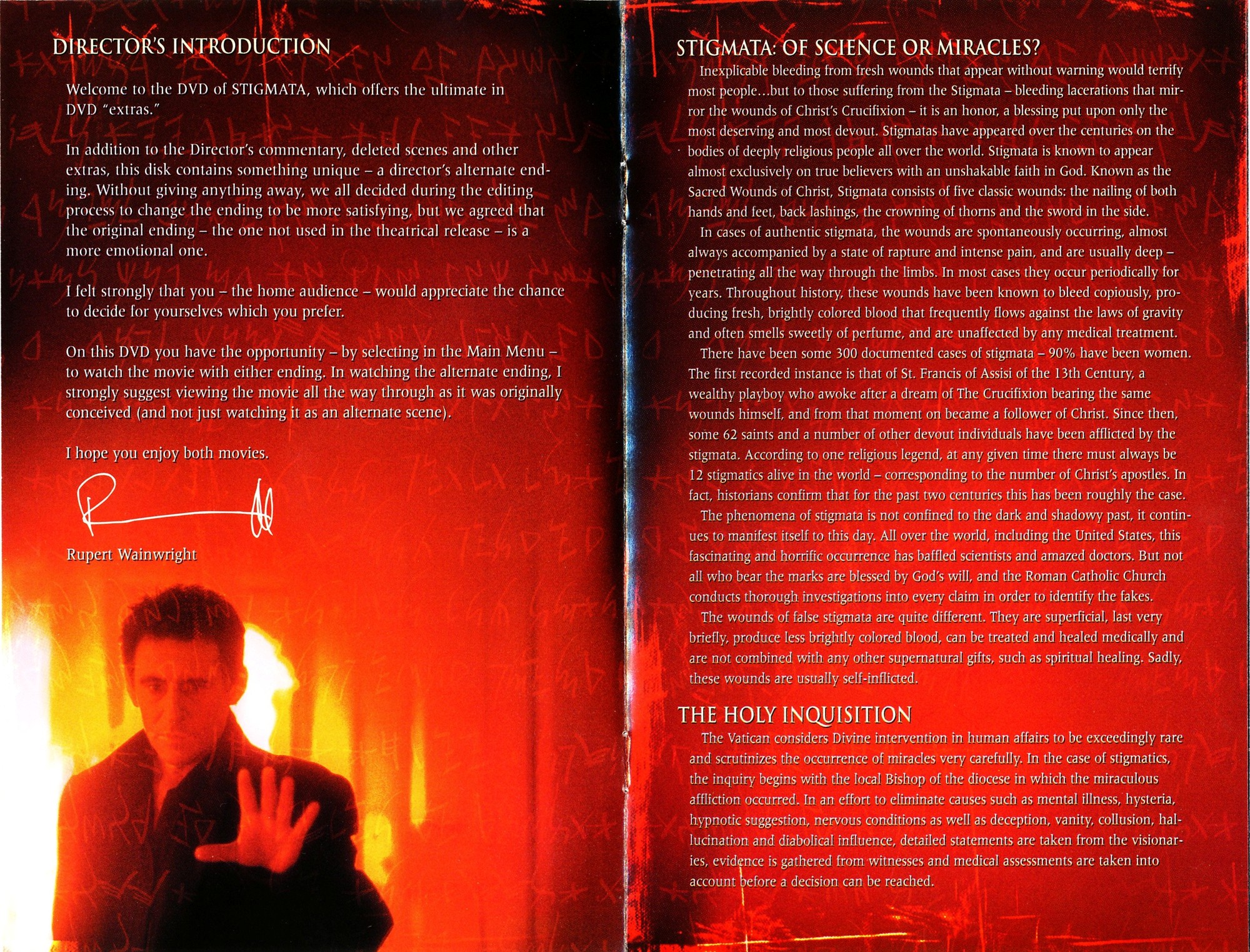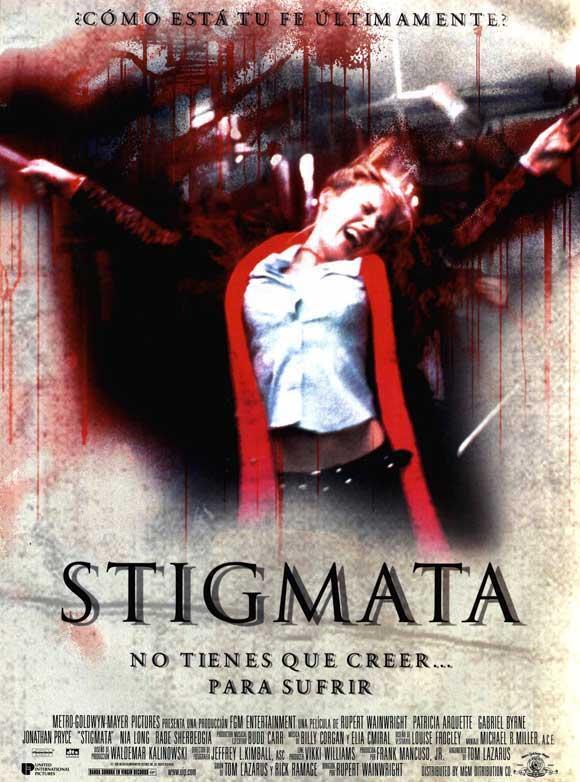Stigmata (1999): Top Quotes & Movie Insights You Need To Know!
Is it a descent into religious horror or an exploration of the divine? "Stigmata" (1999), starring Patricia Arquette, Gabriel Byrne, and Jonathan Pryce, transcends simple genre classification, offering a provocative and visually arresting cinematic experience that continues to spark debate and fascination more than two decades after its release.
The film, directed by Rupert Wainwright, delves into the unsettling narrative of Frankie Paige (Arquette), a young hairdresser living a seemingly ordinary life in Pittsburgh. Her world is irrevocably altered when she begins to experience the stigmata the physical manifestation of the wounds of Christ. This phenomenon, traditionally associated with religious mystics, throws her life into turmoil, attracting the attention of both the Catholic Church and a shadowy conspiracy that threatens to unravel the very foundations of faith.
The film's premise is certainly intriguing. When a young woman becomes afflicted by stigmata, a priest, played by Gabriel Byrne, is sent to investigate her case, which could have severe ramifications for his faith and for the Catholic Church itself. The screenplay, penned by Rick Ramage and Tom Lazarus, takes a more cerebral approach than earlier cinematic explorations of similar themes. The source of the stigmata in "Stigmata" originates from a completely different place, shifting the focus from the traditional tropes of demonic possession towards something far more complex and potentially subversive.
- Carlos Alazraquis Net Worth In 2024 How He Makes His Millions
- Find Jojos Bizarre Adventure Cosplay Shop Now Discover
Here's a closer look at the central figures of this gripping thriller:
| Actor | Character | Brief Description |
|---|---|---|
| Patricia Arquette | Frankie Paige | A young hairdresser who becomes afflicted with stigmata. |
| Gabriel Byrne | Father Andrew Kiernan | A Vatican investigator sent to examine Frankie's case. |
| Jonathan Pryce | Cardinal Daniel Houseman | A high-ranking member of the Catholic Church with a vested interest in controlling the narrative. |
| Nia Long | Donna Chadway | Frankie's friend. |
| Ennio Morricone | Composer | The film's music score was provided by Ennio Morricone |
For further information, you can consult the Internet Movie Database (IMDb): Stigmata (1999) - IMDb
The film's visuals are striking. The scene where Frankie, possessed by the spirit of a martyred priest, tears apart her apartment and then levitates in a cruciform position is particularly memorable. Director of photography, Jeffrey L. Kimball, captures the intensity of the moment. During this scene, there is a quick, sweeping shot of the wall. The film makers cleverly used an array of Ritz Cracker boxes in this scene.
One of the most chilling moments in "Stigmata" occurs when Cardinal Daniel Houseman, played with chilling gravitas by Jonathan Pryce, confronts Frankie. In his attempt to silence her, he utters the chilling words, "[while trying to strangle frankie] I'll not let you destroy my church!" This underscores the central conflict of the film: the clash between the established authority of the Church and the potential for a more radical, direct experience of the divine. The film provides a fascinating perspective on the interpretation of faith and authority.
The film's exploration of spirituality goes beyond the confines of religious dogma. The Gospel of Thomas, a non-canonical text discovered hidden beneath a church floor in Brazil, becomes a central element in the plot. This discovery challenges the official narrative and suggests that the true message of Christ might be found outside the established structures of the Church. The film seems to suggest that the kingdom of god is within you and all around you, and it is not within buildings of wood or stone. "Split a piece of wood and you will find me. Look beneath a stone and I am there," as the Gospel proclaims.
The film offers several memorable quotes that encapsulate its core themes and ideas. Here are a few examples:
- "The kingdom of God is within you and all around you. It is not within buildings of wood or stone. Split a piece of wood and you will find me. Look beneath a stone and I am there."
- "[While trying to strangle Frankie] I'll not let you destroy my church!" - Cardinal Daniel Houseman
- "The messenger is of no importance."
- "Hey, you know what's scarier than not believing in God? I mean, really believing in Him. It's a f ing terrifying thought."
The film's success also owes much to its strong supporting cast. Fans of TV's "Ally McBeal" will recognize Portia de Rossi, in a supporting role. The film has some well-designed scenes. Frankie tears up the apartment, possessed by the priest, she goes to the bed and levitates in a cruciform position.
The film's soundtrack, helmed by Billy Corgan, the lead singer of the Smashing Pumpkins, perfectly complements the film's tone. It provides an atmosphere that goes in sync with the subject of the film.
In the chaotic scene, where gunfire echoes and violence permeates the air, "Amid the chaos of that day, when all I could hear was the thunder of gunshots, and all I could smell was the violence in the air, I look back and am amazed that my thoughts were so clear and true, that three words went through my mind endlessly, repeating themselves like a broken record: You're so cool, you're so cool, you're so cool."
While some mainstream audiences may view "Stigmata" as a sensationalistic horror film, a "The Exorcist" wannabe, for those interested in theological thought and religious history, the film provides a fascinating and thought-provoking experience. It's a film that invites multiple interpretations and sparks conversation.
The film's lasting impact lies in its willingness to ask challenging questions about faith, doubt, and the nature of the divine. "Stigmata" may not offer easy answers, but its bold exploration of these complex themes ensures its place as a provocative and memorable work of cinema. The phenomenon of stigmata is central to the plot, and the film explores its implications with intelligence and visual flair.
It has been noted that the film confuses the phenomenon of stigmata with satanic possession. This is a point of potential debate.
- Find Kathy Murray Profiles Info Linkedin Facebook More
- Cookie Cutter Guide Trophies Value Gameplay Insights

Stigmata Movie Quotes

Stigmata Movie Quotes

Stigmata Movie Quotes